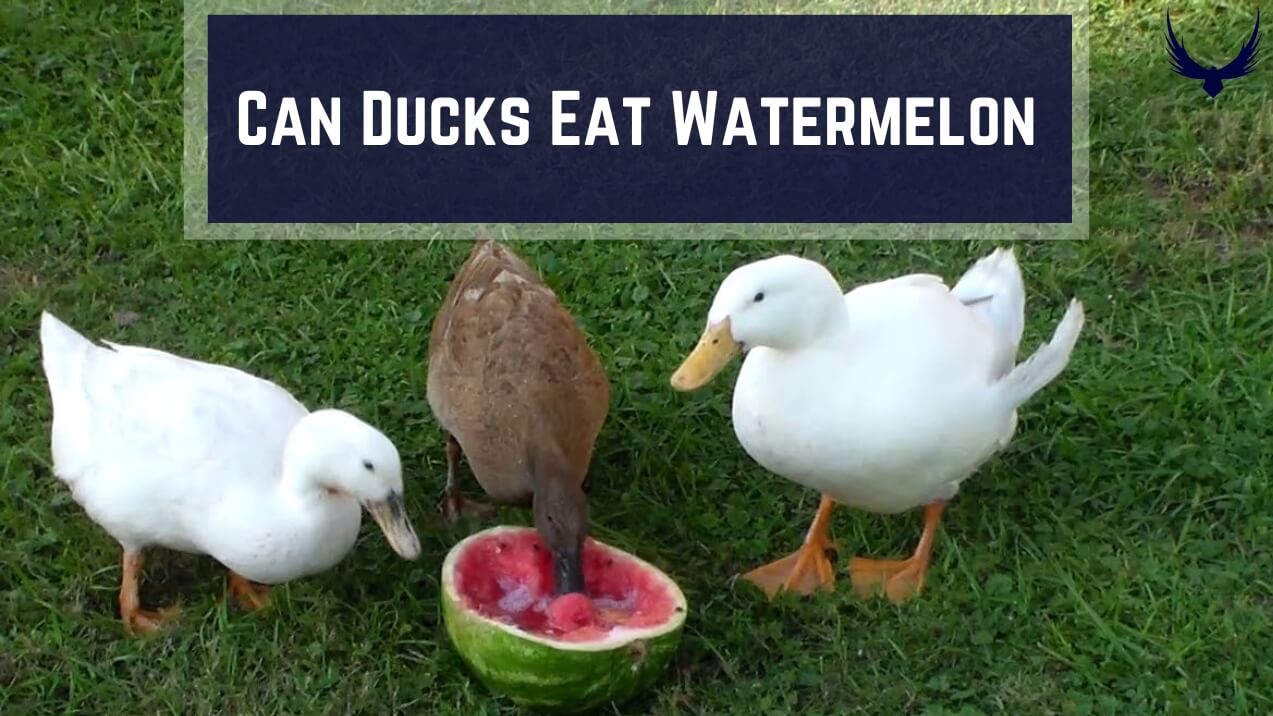Ducks are wonderful backyard birds with quite flexible eating habits. Have you ever seen ducks eating watermelon by a calm pond? Ducks usually eat vegetables like tomatoes and small fish, so seeing them enjoy watermelon might be surprising.
Let’s find out can ducks eat watermelon? And do they like this sweet treat!
Can Ducks Eat Watermelon?
Ducks can eat variety of foods including watermelon as a healthy and refreshing treat, especially in hot weather. It’s important to feed them watermelon in moderation as a treat, not as a main part of their diet. Ducks need a balanced diet of commercial waterfowl feed, grains, greens, and protein.
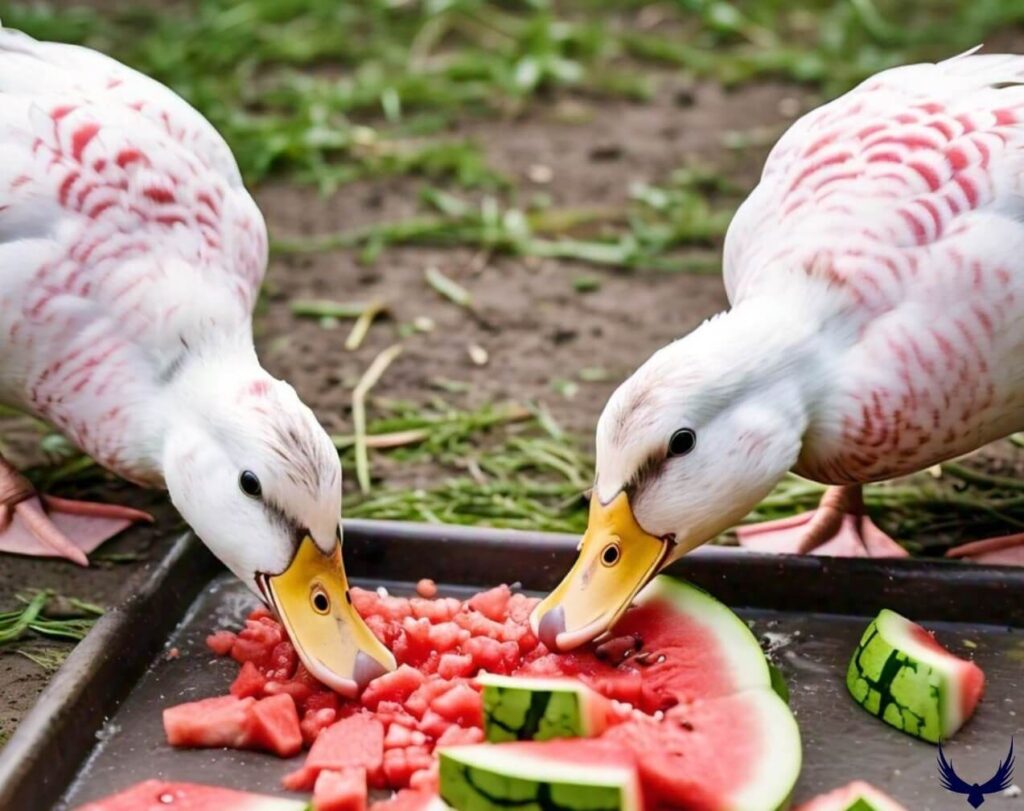
Remember to feed it carefully and keep an eye on your ducks for any issues when feeding watermelon. If you notice any problems, stop giving them watermelon and consult a vet if needed.
Nutritional Benefits of Watermelon for Ducks
Watermelon can provide several health benefits for ducks when fed in moderation as part of a balanced diet. Here’s a guide to the health benefits of watermelon for ducks:
Vitamins
Vitamin A: Watermelon is a good source of vitamin A, which is essential for ducks’ vision, immune function, and reproductive health.
Vitamin C: Watermelon contains vitamin C, an antioxidant that supports the immune system and aids in wound healing.
Vitamin B6: This vitamin is important for proper metabolic function and energy production in ducks.
Minerals
Magnesium: Watermelon has magnesium, an important mineral for ducks. Magnesium helps with energy, protein, and muscle function. It also helps ducks absorb calcium and phosphorus for strong bones and egg production.
Sodium: Watermelon contains a moderate amount of sodium, which is an electrolyte that helps maintain proper fluid balance and nerve function in ducks. Sodium is particularly important during hot weather or periods of increased activity, as ducks may lose electrolytes through sweating or panting.
Iron: Watermelon provides a small amount of iron, which is an essential mineral for ducks. Iron is a critical component of hemoglobin, the protein responsible for carrying oxygen in the bloodstream. It also plays a role in energy production, immune function, and feather development in ducks.
Potassium: Watermelon is rich in potassium, an electrolyte that plays a role in muscle function, nerve transmission, and maintaining fluid balance.
Antioxidants
Watermelon is a good source of antioxidants like lycopene, which can help neutralize free radicals and reduce oxidative stress in ducks. Antioxidants may also support their immune system and overall health.
Fibers
Watermelon contains a small amount of fiber, which can aid in digestion and maintain a healthy digestive system in ducks
Hydration
Watermelon is composed of about 92% water, making it an excellent source of hydration for ducks during hot summer months when they are prone to dehydration.
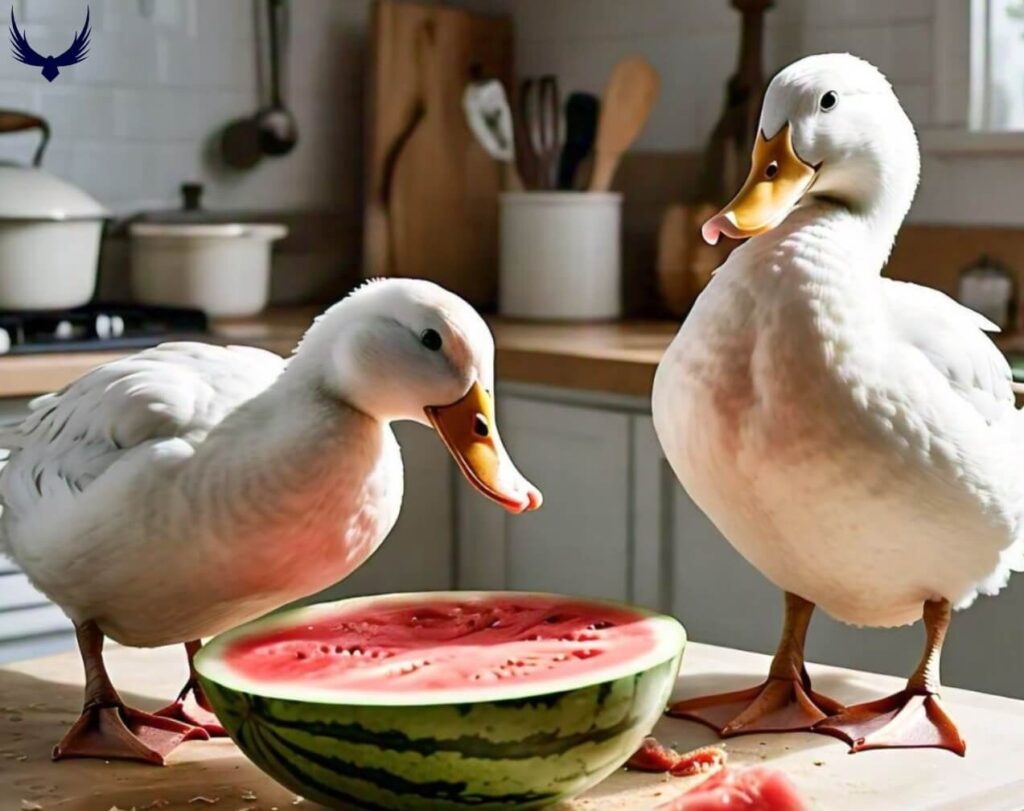
The high-water content can help prevent dehydration and maintain proper fluid balance.
Low in Calories and Fat
Watermelon is low in calories and fat, making it a refreshing and nutritious treat for ducks without contributing to excessive weight gain.
What Parts of Watermelon Can Ducks Eat?
When it comes to feeding watermelon to ducks, it’s important to understand which parts of the watermelon are safe for them to consume and which parts should be avoided. Here’s a guide on the parts of watermelon that ducks can eat:
Watermelon Flesh
The juicy, fleshy part of the watermelon is safe and nutritious for ducks to eat. It’s rich in water content, vitamins, minerals, and antioxidants, making it a refreshing and healthy treat. Always remove any seeds before feeding the flesh to ducks, as seeds can cause digestive issues.
Watermelon Rind
The rind, or the hard outer skin of the watermelon, should not be fed to ducks. The rind is tough and fibrous, making it difficult for ducks to digest. Always remove the rind before giving watermelon to ducks.
Watermelon Seeds
Watermelon seeds should also be removed before feeding the watermelon to ducks. Few seeds may not cause harm, a large quantity of seeds can lead to digestive issues. Seeds can also sprout and grow inside a duck’s digestive system and make them sick.
How to Serve Watermelon for Your Ducks?
Serving watermelon to your ducks can be a refreshing and enjoyable treat for them during hot summer days. Here’s how to serve watermelon to your ducks:
Preparation
Choose a ripe, fresh watermelon for sweetness and nutrition. Wash the watermelon well to remove dirt and pesticides. Remove the rind and seeds using a knife or melon baller.
Ducks may have trouble digesting the rind and seeds. Cut the watermelon into small pieces for easy consumption and to avoid choking.
Serving
Place the watermelon pieces in a shallow dish, feeding tray, or directly on the ground in the ducks’ area. Mix the watermelon with their food or greens for a healthy diet.
If serving watermelon to group of ducks, distribute the pieces evenly to avoid fight or bullying over the treats.
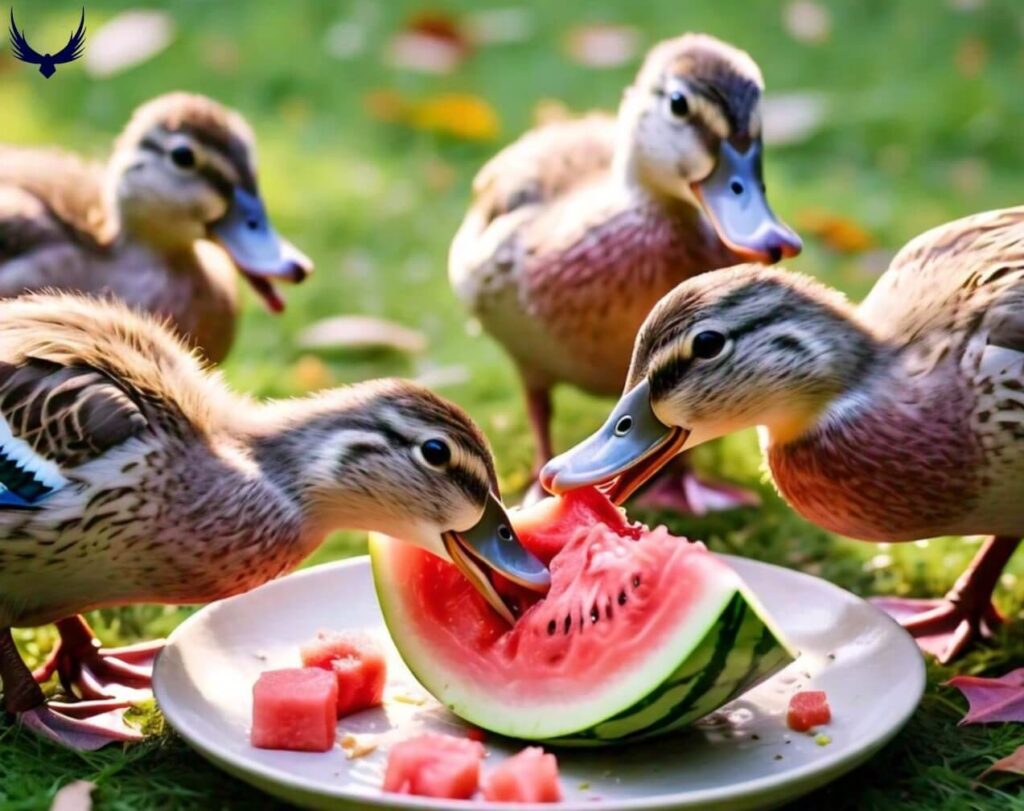
Provide fresh, clean water in a separate dish or container to ensure the ducks stay hydrated while enjoying the watermelon.
Timing and Quantity
It’s best to serve watermelon as an occasional treat rather than a regular part of the ducks’ diet. Start with a small amount and slowly increase. Monitor the ducks closely after feeding them watermelon, and look for any signs of digestive upset, such as diarrhea or lethargy.
Give the right amount based on how many ducks you have and how hungry they are.
Safety Precautions
Remove any leftover watermelon pieces from the enclosure after a few hours to prevent spoilage or attracting pests. Throw away any watermelon pieces that have been contaminated with dirt, feces, or other debris. Wash the feeding dishes or trays thoroughly after use to maintain proper hygiene.
Watermelon Treat Ideas for ducks
Offering watermelon as a treat to ducks can be a refreshing and enjoyable experience for your feathered friends. Here are some watermelons treat ideas for ducks:
Watermelon Cubes
Cut the watermelon flesh into small, bite-sized cubes, removing the rind and seeds. Place the cubed watermelon pieces in a dish or feeding tray.
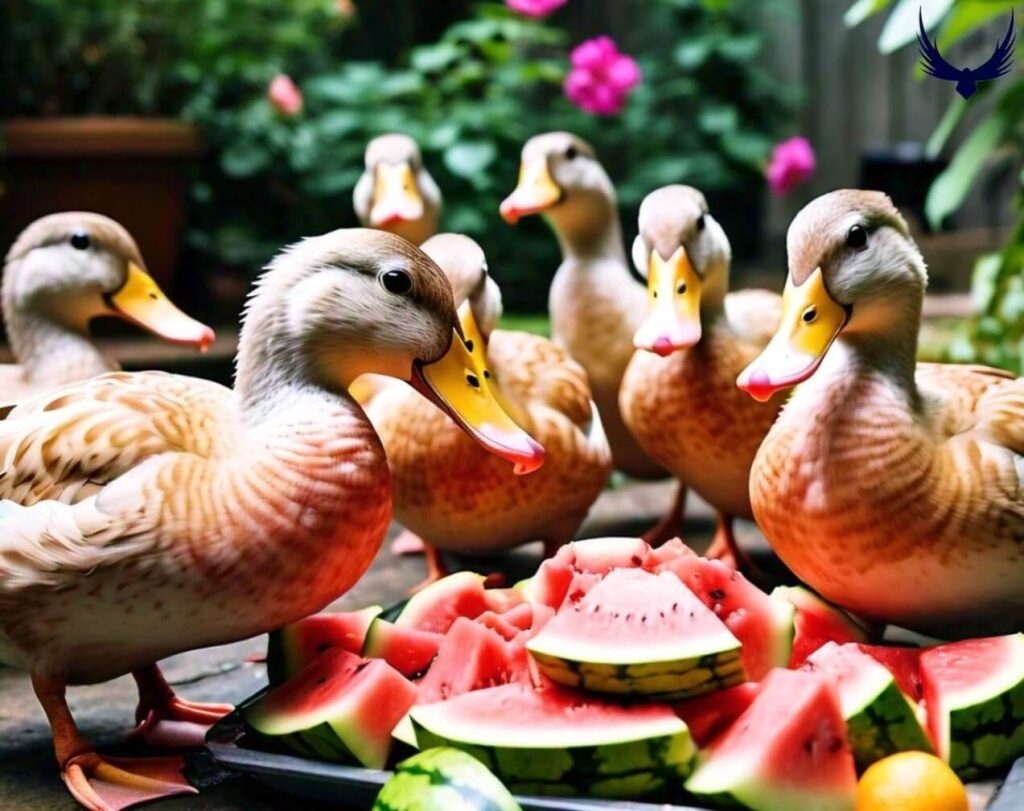
This makes it easy for the ducks to eat and enjoy the juicy watermelon.
Watermelon Fruit Salad
Mix cubed watermelon with berries, bananas, or chopped grapes for ducks. Put the fruit salad in a bowl or feeding tray. Ducks will enjoy this colorful and healthy treat.
Watermelon and Greens Medley
Cut up fresh greens such as kale, spinach, or lettuce. Mix the greens with cubed watermelon. This mix of watermelon and greens is a good snack for ducks.
Frozen Watermelon Treats
Blend watermelon until smooth. Pour the watermelon purée into ice cube trays or small containers. Freeze until solid. Give frozen watermelon treats to ducks on hot days for a refreshing snack.
Risks of Feeding Watermelon to Ducks
Feeding watermelon to ducks can be a refreshing and hydrating treat, but it’s important to be aware of the potential risks and take necessary precautions. Here are the risks of feeding watermelon to ducks:
Overfeeding: Watermelon is high in water content and can be hydrating, excessive consumption can lead to digestive issues such as diarrhea and bloating
Digestive Issues
Watermelon Rind: The rind of the watermelon is tough and fibrous, making it difficult for ducks to digest. Ingesting the rind can cause intestinal blockage.
Watermelon seeds: Watermelon seeds can be a potential choking hazard for ducks, and they may also sprout and grow inside their digestive system, leading to health issues.
Nutritional Imbalances
If watermelon is fed in excessive amounts, it can displace other essential nutrients in a duck’s diet, leading to nutritional deficiencies.
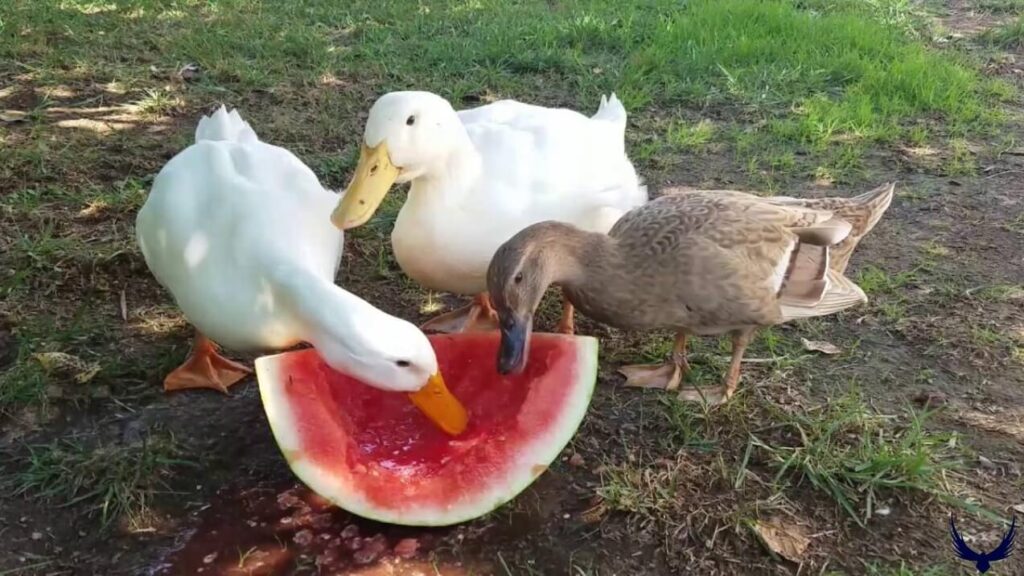
Watermelon is high in natural sugars, and overconsumption can contribute to obesity, metabolic issues, and other health issues.
Pesticide and Chemical Exposure
Farmers often use chemicals on conventionally grown watermelons to protect them from pests. If ducks eat these watermelons without washing them first, the chemicals can make them sick.
Bacterial or Fungal Contamination
Watermelons can harbor harmful bacteria, such as Salmonella or E. coli, if not stored properly. Moldy or spoiled watermelon can also contain mycotoxins, which are toxic substances produced by certain fungi that can be harmful to ducks if eaten.
How Often Can Ducks Have Watermelon?
Frequency: Ducks can safely eat watermelon only once or twice a week. It shouldn’t be a daily food item, but rather a supplementary snack to their regular diet.
Quantity: When offering watermelon to ducks, provide small bite-sized pieces. A good rule of thumb is to give each duck a few cubes equivalent to 1 to 2 tablespoons of watermelon per feeding.
Can Ducklings Eat Watermelon?
Newly hatched ducklings should never be given watermelon until they are 2 to 3 weeks old. Their stomachs are still growing, so they should mainly eat high-protein duck feed. At around 3 to 4 weeks old, you can give them a little watermelon as a treat, along with their regular food.
Ducklings eat less and have smaller stomachs than adult ducks, so start with tiny pieces of watermelon. Give them small, seedless, and rind-free bits of watermelon first. See how they handle it and adjust the amount accordingly.
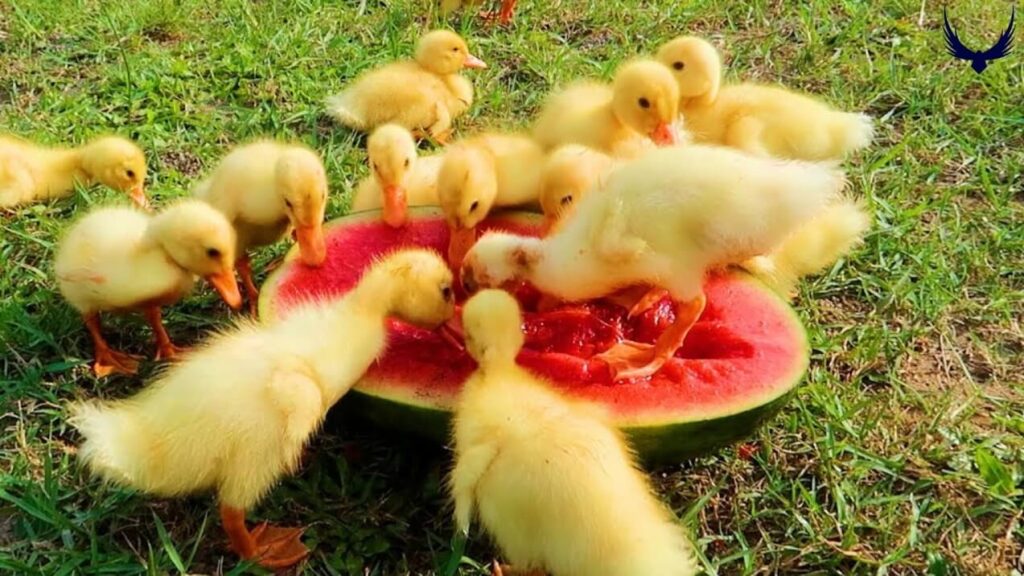
Cut the watermelon into small pieces or mash it to make it easier for them to eat. Don’t give them big chunks as they might have trouble swallowing.
Keep an eye on the ducklings after giving them watermelon for the first time. Look for signs like diarrhea or tiredness, which could mean the watermelon doesn’t suit them.
Watermelon should be an occasional treat, not a replacement for their main diet. Make sure they have their regular food and protein sources like mealworms for proper growth.
FAQs – Can Ducks Eat Watermelon?
Do Ducks Like Watermelon?
Yes, ducks enjoy eating watermelon. The sweet, juicy flesh of the watermelon is appealing and refreshing for them.
Can Ducks Drink Watermelon Juice?
Yes, ducks can drink watermelon juice in moderation. It should not replace their regular access to fresh, clean drinking water.
Can Wild Ducks Eat Watermelon?
Wild ducks can eat watermelon. The sweet and juicy fruit can be a hydrating and nutritious snack for them.
Can Pekin Ducks Eat Watermelon?
Yes, Pekin ducks can eat watermelon. The juicy flesh of the watermelon is a refreshing and hydrating treat for them in hot weather. Feed it in moderation as a snack and remove the rind and seeds to avoid digestive problems.
Is It Okay to Feed Dried Watermelons to Ducks?
Feeding dried watermelons to ducks is not recommended. It’s okay to give dried watermelons to ducks occasionally because the sugar is natural. Dried watermelon lacks high-water content. The drying process can concentrate sugars and alter the nutritional composition in a way that may not be suitable for a duck’s balanced diet.
Can Ducks Eat Watermelon Rinds?
No, ducks should not eat watermelon rind because it is tough, fibrous, and hard for them to digest. This can cause digestive problems like blockages. Always remove the rind before giving watermelon to ducks.
Can Ducks Eat Watermelon Seeds?
Ducks should not eat watermelon seeds because they can choke or cause stomach problems. Remove all seeds from watermelon before giving it to ducks.
At What Age Can Ducks Eat Watermelon?
Wait until the ducklings are 1 month old before giving them watermelon. Their stomachs are still growing, so they should mainly eat high-protein duck starter feed.

